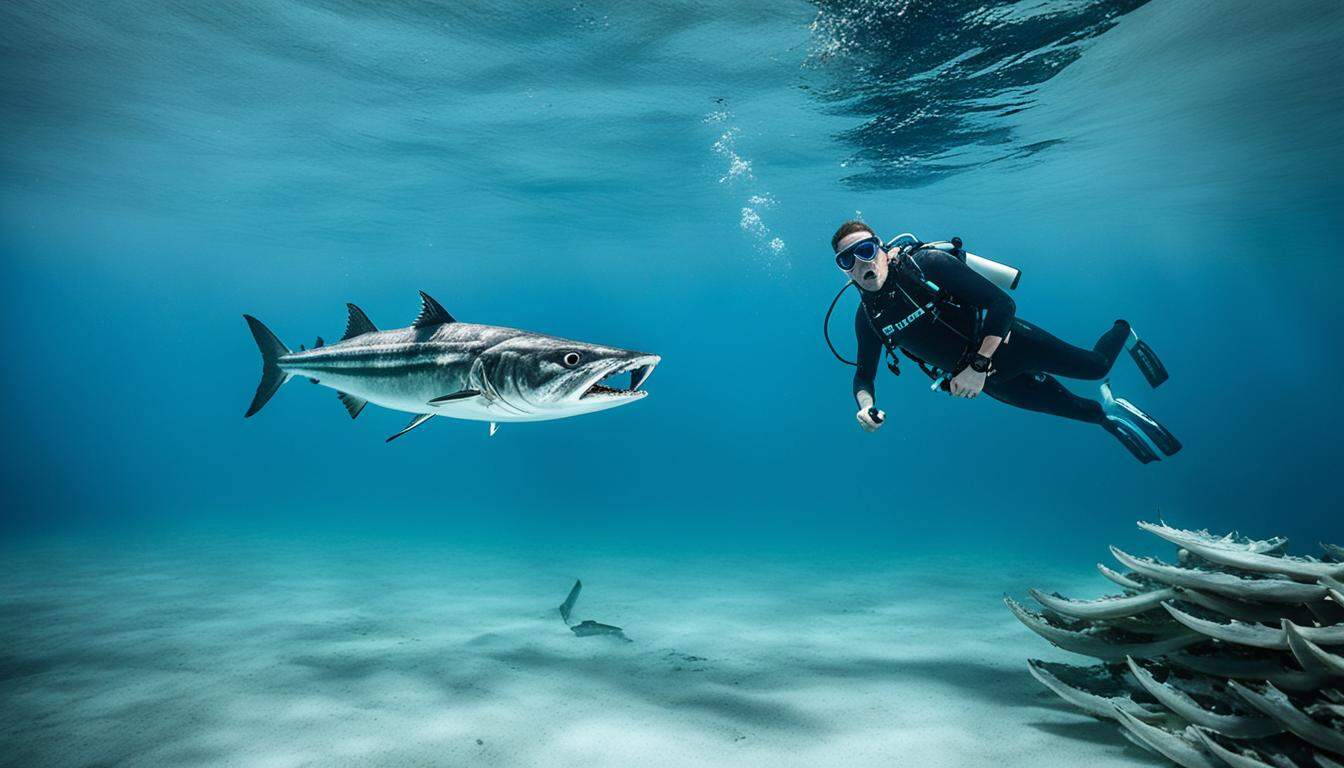Many marine animals make us nervous, and the barracuda is one of them. People often wonder, are barracudas dangerous to humans? This question is big for those who love the ocean. The great barracuda is fast and has sharp teeth, making it seem scary. But, how dangerous are they really?
Let’s look into the facts about barracuda attacks on humans. These attacks are rare, but they do happen. We’ll see what makes people fear them and how dangerous they actually are.
Understanding Barracuda Behavior
To understand barracuda behavior, we need to look at their physical traits, where they live, and how they spread out. These fish have special features that make them great hunters in different water places.
Characteristics of Barracudas
Barracudas are known for their streamlined bodies which help them move fast. They have some key traits:
- Sharp serrated teeth for catching prey easily.
- Prominent dorsal fins that help them move quickly.
- Distinctive coloration, usually silver with dark stripes, for hiding in their surroundings.
These traits are key to understanding how barracudas behave. They help them hunt better and stay safe from danger.
Habitat and Distribution
Barracudas live in tropical and subtropical waters. They are mostly found in areas like:
- The western Atlantic Ocean
- The Gulf of Mexico
- The Caribbean Sea
Young barracudas live in shallow, coastal waters near reefs. Adults prefer the open ocean. This shows how they can adapt to different places.
Are Barracudas Dangerous to Humans?
Let’s look into whether barracudas are aggressive towards people. These fish are known for their fierce look, but the facts show they’re not a big threat. In the past 90 years, there were only 29 reported barracuda attacks, with 19 happening in the U.S. This shows that getting hurt from a barracuda is very rare.
Statistics on Barracuda Attacks
Many people fear barracudas because they don’t know the truth about them. A lot of what we think are attacks are actually mistakes. Here’s a table with the important stats on barracuda attacks over the years.
| Time Period | Total Reported Attacks | Confirmed Attacks in the US | Estimated Human Interactions |
|---|---|---|---|
| 1930-1940 | 3 | 2 | 10,000+ |
| 1941-1950 | 5 | 3 | 15,000+ |
| 1951-1960 | 6 | 4 | 20,000+ |
| 1961-1970 | 8 | 5 | 25,000+ |
| 1971-2020 | 7 | 5 | 100,000+ |
The numbers show that serious encounters between humans and barracudas are rare. If you’re planning an ocean trip, knowing this can help calm your fears. It’s important to respect their place in the ocean and remember that running into an aggressive barracuda is unlikely.

Barracuda Attacks on Humans
Looking into barracuda attacks on humans shows us the serious risks they pose. We can learn a lot from past incidents. These stories help us understand the dangers of dealing with these fish.
Notable Incident Reports
In the 1960s, two fishermen in Maui had a scary run-in with barracudas. This event showed how unpredictable these fish can be. Later, in Cozumel, a diver got badly hurt by a barracuda. These stories remind us of the dangers of swimming or diving where barracudas live.
Injuries and Medical Implications
Barracuda bites can cause serious injuries. They often hurt tendons and nerves, making recovery hard. If tendons get damaged, surgery might be needed. Victims often get a lot of medical care, including wound treatment and rehab.
This shows us why we should respect these powerful fish. It’s key to be careful around them.
| Incident Location | Year | Nature of Injury | Medical Response |
|---|---|---|---|
| Maui | 1960s | Severe lacerations | Surgical repair and rehabilitation |
| Cozumel | Recent | Deep tissue damage, nerve injury | Emergency treatment and long-term therapy |
How Dangerous Are Barracudas?
When looking at how dangerous barracudas are, we need to consider what makes them act aggressively. Knowing these factors helps us stay safe in the water and clears up misconceptions about barracudas.
Factors That Influence Attack Behavior
Barracudas can be aggressive for many reasons. Some main factors include:
- Environmental Conditions: Changes in water temperature and clarity can change how barracudas behave. In warmer waters, they might be more active and meet humans more often.
- Shiny Objects: Things that reflect light, like jewelry or gear, can attract barracudas. They might think these are food, which could lead to an encounter.
- Swimmer or Diver Behavior: Quick or unpredictable movements can make barracudas curious or aggressive. Moving calmly and steadily is best to avoid drawing attention.
Comparing Barracuda Attacks to Other Marine Threats
It’s useful to compare barracuda attacks to other dangers in the sea. Barracuda attacks are much rarer than those from sharks or jellyfish. Here’s a table showing how often different sea creatures attack:
| Marine Animal | Attack Frequency | Potential Severity of Injuries |
|---|---|---|
| Sharks | More Frequent | Severe |
| Jellyfish | Common | Moderate |
| Barracudas | Rare | Minor to Moderate |
Even though barracuda attacks are rare, knowing about ciguatera poisoning is important. This knowledge helps keep you safe while fishing or diving, letting you enjoy the water with peace of mind.
Do Barracudas Harm Humans?
Barracudas are often seen as scary predators, but it’s key to know the real risks they pose to people. They can cause ciguatera poisoning, which happens when you eat fish that ate toxic algae. This can lead to stomach problems like nausea and diarrhea, and even make breathing hard.
Ciguatera Poisoning and Its Risks
Ciguatera poisoning is a big worry when talking about barracudas and humans. These toxins build up in the fish and get stronger in bigger or older ones. Eating infected barracuda can cause serious health problems. It’s important to know about this risk if you like fishing or eating seafood in tropical areas.
Incidents of Misidentification
There are also cases where people and barracudas get mixed up. This happens when people with shiny things look like fish to them. These mistakes can lead to accidental bites. Knowing how barracudas act can help avoid these risks. While barracudas can be dangerous, learning about them can make you safer around them.
FAQ
Are barracudas dangerous to humans?
Barracudas are not usually aggressive towards people. However, they can be dangerous in certain situations. Most of the time, they attack because they mistake humans for something else. This makes attacks on humans very rare.
What do I need to know about barracuda attacks on humans?
Barracuda attacks on humans are very rare. In the last 90 years, there were only 29 reported cases. Of those, 19 happened in the United States. Knowing how they behave can help you stay safe when you meet them.
How can I recognize the behavior of barracudas?
Barracudas move quickly and are curious. They like shiny things. This can sometimes lead them to think divers or snorkelers are something else, which can cause them to act out.
What injuries can result from barracuda bites?
Barracuda bites can be very serious. They often hurt tendons and nerves. Some people have had to deal with long-term health issues after being bitten.
What factors might lead to barracuda aggression?
Barracudas might become aggressive because of their surroundings, shiny objects, or how people act in the water. Knowing what can make them upset can help you avoid trouble.
Are there risks associated with ciguatera poisoning from barracudas?
Yes, eating barracudas that have eaten toxic algae can lead to ciguatera poisoning. This can cause serious stomach and nerve problems. So, it’s important to be careful when eating barracuda.
Can I safely interact with barracudas while snorkeling or diving?
You can safely be around barracudas if you don’t wear shiny jewelry and stay calm in the water. This can help prevent them from thinking you’re something else and attacking you.
How do barracuda attacks compare with other marine predators?
Barracuda attacks are not as common or aggressive as those from other sea creatures. Knowing how they act can help you understand the risks better when compared to sharks or other big fish.







